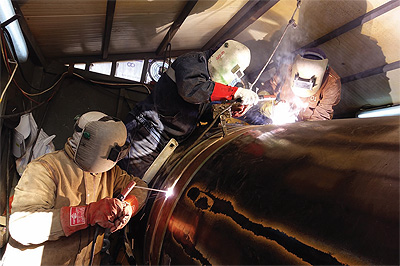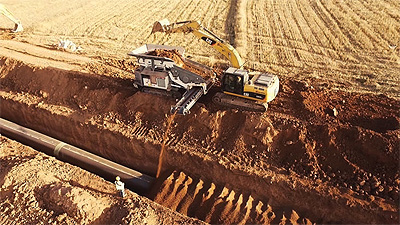Trans Anatolian Natural Gas Pipeline Project
Bold plans in the pipeline
Building the bonds of brotherhood in the modern world with the promise of ‘one nation, two states’, Turkey and Azerbaijan are extending the success of previous projects in the energy sector with the Trans-Anatolian Natural Gas Pipeline Project (TANAP). Bonding the countries together with a mission of huge importance, the TANAP project will establish a voice in the world energy  markets by focusing on meeting the natural gas needs of both Europe and Turkey while also offering diversity in gas products.
markets by focusing on meeting the natural gas needs of both Europe and Turkey while also offering diversity in gas products.
Developed to meet the growing demand for natural gas in Turkey while also contributing to the socio-economic development of the country, the TANAP project officially started following the signing of the Memorandum of Understanding between the State Oil Company of Azerbaijan Republic (SOCAR) within the framework of the TANAP Natural Gas Transmission Company in June 2012. With the TANAP project established, the design, construction and subsequent operation of the project was authorised too. Following this, the Intergovernmental Agreement concerning the Trans-Anatolian Natural Gas Pipeline System between the Government of the Republic of Turkey and the Government of the Republic of Azerbaijan as well as the Host Government Agreement, which constitute the legal basis of the project, were signed in Istanbul on June 26th 2012.
Amended and signed on May 26 2014, the revised Host Government Agreement was ratified by the Grand National Assembly of Turkey on 10th September 2014. Since then, TANAP has focused on its policy to ship Azerbaijani gas to Turkey and Europe through natural gas pipeline systems that use the best practices and exceed industry standards. While conducting such activities, TANAP will achieve sustainable development objectives such as following all national laws and regulations, applicable international standards, best practices within the natural gas industry and carrying out all work within the project in full compliance with the requirements of national health, safety and environmental regulations.
Involving the construction of a 1850 km long pipeline to supply gas from Azerbaijan, a country with gas reserves that exceed three million cubic metres, to Turkey and Europe, the construction of TANAP project began in March 2015. Shareholders of the project is SOCAR, BOTAS and BP, with 58 per cent, 30 per cent and 12 per cent shares respectively.
Traversing 20 provinces, 67 districts, 600 villages and running for 19 km below the Sea of Mamara, the 56 inch and 48 inch pipeline system is to stretch from the Turkish village of Türkgözü in the  Posof district of Ardahan province; it will then connect to the South Caucasus Pipeline (SCP) and will culminate at the Ipsala district of Edirne province on the Turkish-Greek border. From here it will then be linked to the Trans-Adriatic Pipeline (TAP) and connect to convey natural gas to European nations. Two off-take stations are located within Turkey for national natural gas transmission, one located in Eskisehir and the other in Thrace.
Posof district of Ardahan province; it will then connect to the South Caucasus Pipeline (SCP) and will culminate at the Ipsala district of Edirne province on the Turkish-Greek border. From here it will then be linked to the Trans-Adriatic Pipeline (TAP) and connect to convey natural gas to European nations. Two off-take stations are located within Turkey for national natural gas transmission, one located in Eskisehir and the other in Thrace.
Alongside the pipeline, a number of off-take stations and underground installations are to be constructed; this includes seven compressor stations, four measuring stations, 11 pigging stations, 49 block valve stations and two take-off stations that will supply Turkey’s national natural gas network. In addition to these aboveground installations, temporary camps to accommodate workers, pipe storage areas and access roads will also be built during the construction phase.
Sourcing gas from Azerbaijan’s Shah Deniz II field in the Caspian Sea, the new pipeline was scheduled to start in 2018 and will supply ten billion cubic metres of gas annually to Europe as well as six billion cubic metres of gas per year to Turkey. The pipeline’s capacity will have been increased to 31 billion cubic metres. However, with TANAP General Director Saltuk Düzyol pointing out that 80 per cent of the section of the phase zero TANAP line has been completed in April 2017, it is anticipated that the first delivery of gas will be delivered in June 2018.
Described by BP as the global oil and gas industry’s ‘most significant and ambitious undertaking yet’, the TANAP project, which involves seven countries and 11 companies, will be regionally integral when it comes to meeting the future gas demands of both Turkey and the EU. Furthermore, the project will ensure Azerbaijan’s integration with the world as an important and strategic natural gas exporter as Turkey and Azerbaijan emerge together into the European market for energy transportation. However, above all else, those involved in TANAP remain committed to their mission of building and operating a secure and reliable gas transmission pipeline system of the highest quality, while also ensuring health and safety and high social and environmental standards are maintained.
Trans Anatolian Natural Gas Pipeline Project
Services: Meeting the gas needs of Europe and Turkey